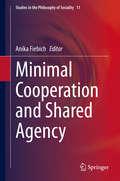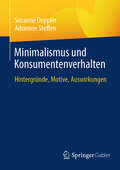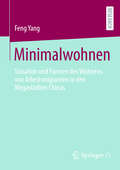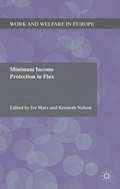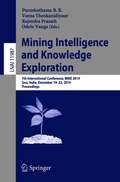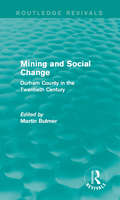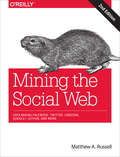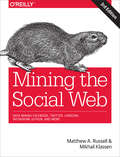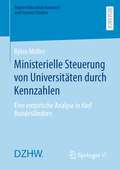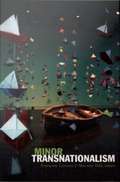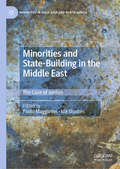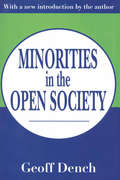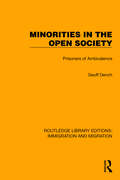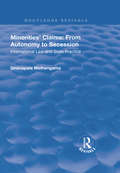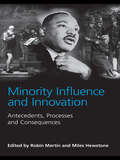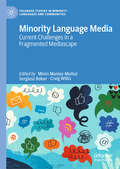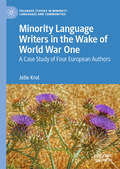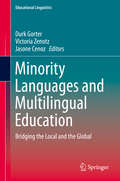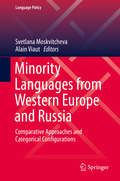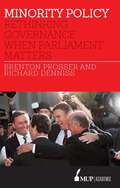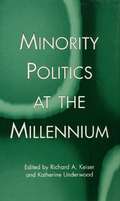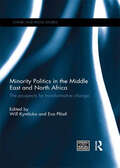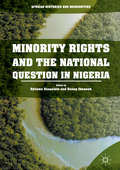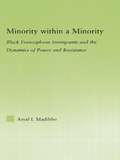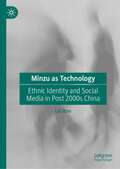- Table View
- List View
Minimal Cooperation and Shared Agency (Studies in the Philosophy of Sociality #11)
by Anika FiebichThis volume examines minimality in cooperation and shared agency from various angles. It features essays written by top scholars in the philosophy of mind and action. Taken together, the essays provide a genuine contribution to the contemporary joint action debate.The main accounts in this debate present sufficient rather than necessary or minimal criteria for there to be cooperation. Much discussion in the debate deals with robust rather than more attenuate and simple cases of cooperation or shared agency. Focusing on such minimal cases, however, may help to explain how cooperation comes into existence and how minimal cooperation interrelates with more complex cases of cooperation. The contributors discuss minimality in cooperation by focusing on particular aspects. For example, they consider how social roles might deliver minimal cooperation constraints or what the minimal contextual criteria are for cooperation to emerge.Readers will find the answers to these and other questions: What is minimally cooperative behavior? By what steps could full members of a society organized by conventions, norms and institutions be constructed from creatures with minimal social skills and cognitive abilities? What do we experience of actions when we act together with a purpose?
Minimalismus und Konsumentenverhalten: Hintergründe, Motive, Auswirkungen
by Adrienne Steffen Susanne DopplerDieses Buch liefert einen Einblick in die theoretischen Grundlagen des minimalistischen Konsums. Durch die Analyse von 20 Tiefeninterviews mit Minimalisten und die Integration neuester wissenschaftlicher Erkenntnisse entsteht zunächst eine präzise datenbasierte Definition dieses Lebensstils. Es werden nicht nur die Motive, die Menschen zu einem minimalistischen Lebensstil bewegen beleuchtet, sondern auch die Auswirkungen auf ihr persönliches Wohlbefinden, ihre allgemeine Lebenssituation (z. B. Arbeit, Familie, soziales Umfeld), ihr Kaufverhalten sowie ihre finanzielle Situation herausgearbeitet. Die Autorinnen schließen mit praxisrelevanten Handlungsempfehlungen für das Produktmanagement, Produktmarketing und die Personalabteilungen von Unternehmen.
Minimalwohnen: Situation und Formen des Wohnens von Arbeitsmigranten in den Megastädten Chinas
by Feng YangIm Zuge der Urbanisierung wird die Stadtbevölkerung bis 2050 weltweit um 2,5 Milliarden Menschen zunehmen. In China, dem Land mit der größten Stadtbevölkerung der Welt, wanderten bis 2016 136 Millionen vom Land in die Städte. An diesem Fall wird gezeigt, wie sich die Unterbringung entwickelte: auf der Ebene der städtebaulichen Eingliederung, der Wohnumgebung, der Gebäude und Wohneinheit. Das Wohnen der Arbeitsmigranten wird im Kontext von Chinas einzigartigem Hukou-System sowie seiner Boden- und Wohnpolitik analysiert. Typische Fälle in Peking, Shanghai und Guangzhou werden auf der Grundlage neu erstellter Typologie ihrer Wohnformen untersucht. Als Methode wird neben Befragen, Messen, Dokumentieren die teilnehmende Beobachtung benutzt. Der Autor wohnte in einer Art „Selbstversuch“ in den untersuchten Typen. Empfehlungen beziehen sich auf politische, stadtplanerische und bauliche Maßnahmen für bestehende sowie neu zu bauende Wohnräume für Arbeitsmigranten. China ist ein besonderer Fall - seine Lösungsansätze können den internationalen Diskurs anreichern, der über die Unterbringung der weltweiten Migrantenströme geführt wird.
Minimum Income Protection in Flux
by Ive Marx Kenneth NelsonThe current economic crisis has presented itself as a formidable challenge to the welfare states of Europe. It is more relevant than ever to ask: do existing minimum income protection schemes succeed in adequately protecting citizens, be it whether they are excluded from work, working, retired, or having children? Drawing on in-depth and up-to-date institutional data from across Europe and the US, this volume details the reality of minimum income protection policies over time. Including contributions from leading scholars in the field, each chapter provides a systematic cross-national analysis of minimum income protection policies, developing concrete policy guidance on an issue at the heart of the European debate.
Mining Intelligence and Knowledge Exploration: 7th International Conference, MIKE 2019, Goa, India, December 19–22, 2019, Proceedings (Lecture Notes in Computer Science #11987)
by Rajendra Prasath Purushothama B. R. Veena Thenkanidiyoor Odelu VangaThis book constitutes the refereed conference proceedings of the 7th International Conference on Mining Intelligence and Knowledge Exploration, MIKE 2019, held in Goa, India, in December 2019. The 31 full papers were carefully reviewed and selected from 83 submissions. The accepted papers were chosen on the basis of research excellence, which provides a body of literature for researchers involved in exploring, developing, and validating learning algorithms and knowledge-discovery techniques. Accepted papers were grouped into various subtopics including evolutionary computation, knowledge exploration in IoT, artificial intelligence, machine learning, image processing, pattern recognition, speech processing, information retrieval, natural language processing, social network analysis, security, fuzzy rough sets, and other areas.
Mining and Social Change: Durham County in the Twentieth Century (Routledge Revivals)
by Martin BulmerThe strong community ties of mining villages are the central concern of this book, which deals with the social history and sociology of mining in County Durham in the twentieth century. Focusing on the country as a whole, this title, first published in 1978, asks what is most distinctive about the area in the past and how it is changing in the present. The personal documents presented in the first chapters of the book bring to life the local mining community with an evocative picture of village life at the turn of the century. These first-hand accounts are integrated with the results of social research carried out at Durham University over a number of years. Mining and Social Change will be of interest to students of history and sociology.
Mining the Social Web: Data Mining Facebook, Twitter, LinkedIn, Google+, GitHub, and More
by Matthew A. RussellWant to tap the tremendous amount of valuable social data in Facebook, Twitter, LinkedIn, and Google+? This refreshed edition helps you discover who's making connections with social media, what they're talking about, and where they're located. You'll learn how to combine social web data, analysis techniques, and visualization to find what you've been looking for in the social haystack--as well as useful information you didn't know existed. Each standalone chapter introduces techniques for mining data in different areas of the social Web, including blogs and email. All you need to get started is a programming background and a willingness to learn basic Python tools. Get a straightforward synopsis of the social web landscape Use adaptable scripts on GitHub to harvest data from social network APIs such as Twitter, Facebook, LinkedIn, and Google+ Learn how to employ easy-to-use Python tools to slice and dice the data you collect Explore social connections in microformats with the XHTML Friends Network Apply advanced mining techniques such as TF-IDF, cosine similarity, collocation analysis, document summarization, and clique detection Build interactive visualizations with web technologies based upon HTML5 and JavaScript toolkits "A rich, compact, useful, practical introduction to a galaxy of tools, techniques, and theories for exploring structured and unstructured data." --Alex Martelli, Senior Staff Engineer, Google
Mining the Social Web: Data Mining Facebook, Twitter, LinkedIn, Instagram, GitHub, and More
by Matthew A. Russell Mikhail KlassenMine the rich data tucked away in popular social websites such as Twitter, Facebook, LinkedIn, and Instagram. With the third edition of this popular guide, data scientists, analysts, and programmers will learn how to glean insights from social media—including who’s connecting with whom, what they’re talking about, and where they’re located—using Python code examples, Jupyter notebooks, or Docker containers.In part one, each standalone chapter focuses on one aspect of the social landscape, including each of the major social sites, as well as web pages, blogs and feeds, mailboxes, GitHub, and a newly added chapter covering Instagram. Part two provides a cookbook with two dozen bite-size recipes for solving particular issues with Twitter.Get a straightforward synopsis of the social web landscapeUse Docker to easily run each chapter’s example code, packaged as a Jupyter notebookAdapt and contribute to the code’s open source GitHub repositoryLearn how to employ best-in-class Python 3 tools to slice and dice the data you collectApply advanced mining techniques such as TFIDF, cosine similarity, collocation analysis, clique detection, and image recognitionBuild beautiful data visualizations with Python and JavaScript toolkits
Ministerielle Steuerung von Universitäten durch Kennzahlen: Eine empirische Analyse in fünf Bundesländern (Higher Education Research and Science Studies)
by Björn MöllerAusgangspunkt der Dissertation ist der Wandel des Verhältnisses zwischen Staat und Universitäten unter dem Paradigmenwechsel des New Public Managements. Dies führte unter anderem dazu, dass die Funktionen des Staates zu Lasten der Einflussmöglichkeiten in den Hochschulbereich reduziert wurden und dem Staat drohte, den Einblick in die Universitäten zu verlieren. Um diesem drohenden Verlust entgegenzuwirken, nutzte der Staat vermehrt kennzahlenbasierte Steuerungsinstrumente. Daraus ergab sich die übergreifende Fragestellung, welche Bedeutung metrifizierende Berichtspflichten und metrifizierte Berichte bei der ministeriellen Steuerung von Universitäten haben. Zur Analyse dieses organisationssoziologischen Problems der Hochschulforschung wurde ein politikwissenschaftlicher Zugang gewählt. Dieser ermöglicht die in der Hochschulforschung häufig abstrakte Beschreibung der Politik als „Staat“ dezidiert auszuformulieren und gleichzeitig die Universität als Untersuchungsgegenstand in der Politikwissenschaft zu etablieren. Daran anknüpfend wurde die Prinzipal-Agenten-Theorie als theoretischer Zugang gewählt. Diese bietet den Vorteil, das hierarchische Verhältnis zwischen Ministerial- und Universitätsvertreter:innen angemessen berücksichtigen zu können.
Minor Transnationalism
by Shu-Mei Shih Françoise LionnetMinor Transnationalism moves beyond a binary model of minority cultural formations that often dominates contemporary cultural and postcolonial studies. Where that model presupposes that minorities necessarily and continuously engage with and against majority cultures in a vertical relationship of assimilation and opposition, this volume brings together case studies that reveal a much more varied terrain of minority interactions with both majority cultures and other minorities. The contributors recognize the persistence of colonial power relations and the power of global capital, attend to the inherent complexity of minor expressive cultures, and engage with multiple linguistic formations as they bring postcolonial minor cultural formations across national boundaries into productive comparison. Based in a broad range of fields--including literature, history, African studies, Asian American studies, Asian studies, French and francophone studies, and Latin American studies--the contributors complicate ideas of minority cultural formations and challenge the notion that transnationalism is necessarily a homogenizing force. They cover topics as diverse as competing versions of Chinese womanhood; American rockabilly music in Japan; the trope of mestizaje in Chicano art and culture; dub poetry radio broadcasts in Jamaica; creole theater in Mauritius; and race relations in Salvador, Brazil. Together, they point toward a new theoretical vocabulary, one capacious enough to capture the almost infinitely complex experiences of minority groups and positions in a transnational world. Contributors. Moradewun Adejunmobi, Ali Behdad, Michael Bourdaghs, Suzanne Gearhart, Susan Koshy, Franoise Lionnet, Seiji M. Lippit, Elizabeth Marchant, Kathleen McHugh, David Palumbo-Liu, Rafael Prez-Torres, Jenny Sharpe, Shu-mei Shih , Tyler Stovall
Minorities and State-Building in the Middle East: The Case of Jordan (Minorities in West Asia and North Africa)
by Idir Ouahes Paolo MaggioliniThis book offers fresh insights to enhance and diversify our understanding of the modern history of the state and societies in today’s Jordan, while also providing examples of why and how scholars can challenge the static and discursively government-minded approaches to minorities and minoritisation – especially the traditional emphasis on demographic balances. Despite its small size and initial appearance of homogeneity, Jordan provides an excellent case of a dynamic, relational, historically contingent and fluid approach to ethnic, political and religious minorities in the context of the imposition of a modern state system on complex and varied traditional societies. The editors and contributors present dynamic and relational perspectives on the status of and historical processes involved in the creation and absorption of minority groups within Jordan.
Minorities in an Open Society
by Geoff DenchMost accounts of ethnic and race relations in Western states are optimistic at heart.They assume that equal participation by minorities will be achieved because it is a "public good" from which citizens will benefi t. Social justice will prevail. In this topical and disturbing book, Geoff Dench challenges these idealistic commentaries, showing that in many instances they do not produce convincing analyses of the position of minorities. He suggests that analysts neglect to explore the web of real interests behind public affi rmations of commitment to integration.
Minorities in the Open Society: Prisoners of Ambivalence (Routledge Library Editions: Immigration and Migration #17)
by Geoff DenchMinorities in the Open Society (1986) challenges optimistic assumptions regarding race relations in western nations, namely that social justice will prevail without much effort. It examines the interests behind public affirmations of commitment to integration, and presents a range of contemporary and historical material which illustrate the double-binds created for minorities by the dominant communities, who offer equality with one hand while obstructing it with the other. Individual members of minorities may be given the opportunity to achieve social prominence – but only to carry out special jobs on behalf of the majority.
Minorities' Claims: International Law and State Practice (Routledge Revivals)
by Gnanapala WelhengamaThis title was first published in 2000: An investigation of how the claims of minority groups for greater political power through 'autonomy' and 'secession' clash with the concerns of the nation-State, and how States’ refusals to respond positively to such claims contribute to the escalation of ethnic conflicts in contemporary multi-ethnic polities. In addition, this book examines the extent to which the international community is prepared to accommodate the concerns of minority groups beyond traditionally identified 'minority rights'. The validity of claims for autonomy with shared-sovereignty, autonomy as an inherent part of self-determination, autonomy as a solution to current ethnic conflicts, secessionist and irredentist movements and their impact on peace and security are analyzed in detail. Most importantly, whether minorities as such can secede from the State in which they live by virtue of self-determination is critically analyzed. The discussion of 'peoples' in the context of self-determination is the first detailed research on this subject to appear in international and human rights literature.
Minority Influence and Innovation: Antecedents, Processes and Consequences
by Robin MartinSocial groups form an important part of our daily lives. Within these groups pressures exist which encourage the individual to comply with the group’s viewpoint. This influence, which creates social conformity, is known as ‘majority influence’ and is the dominant process of social control. However, there also exists a ‘minority influence’, which emerges from a small subsection of the group and is a dynamic force for social change. Minority Influence and Innovation seeks to identify the conditions under which minority influence can prevail, to change established norms, stimulate original thinking and help us to see the world in new ways. With chapters written by a range of expert contributors, areas of discussion include: processes and theoretical issues the factors which affect majority and minority influence interactions between majority and minority group members This book offers a thorough evaluation of the most important current developments within this field and presents consideration of the issues that will be at the forefront of future research. As such it will be of interest to theorists and practitioners working in social psychology.
Minority Language Media: Current Challenges in a Fragmented Mediascape (Palgrave Studies in Minority Languages and Communities)
by Miren Manias-Muñoz Sergiusz Bober Craig WillisThis book provides an overview of the current state of minority-language media, from policy formulation to practice, in various contexts around the world. In the same line, it presents the main challenges and new opportunities in view of digitalization and the influence of new media, providing a complete and useful perspective on the topic. The authors seek to broaden discussion and share knowledge on language equality, language diversity, regulatory framework, digitalization, academic work, public broadcasting, kin state, and sustainable communication from a minority-language media perspective. This volume answers some of the most relevant current questions within the field of study, and it will be of use to university lectures, students, policymakers, research centers, public and private observatories, advisory committees, business professionals, media practitioners, journalists and media managers.
Minority Language Writers in the Wake of World War One: A Case Study of Four European Authors (Palgrave Studies in Minority Languages and Communities)
by Jelle KrolThis book presents a comparative literary study of the works of four writers working in European minority languages - Frisian, Welsh, Scots and Breton. The author examines the different strategies employed by the four writers to create distinctive literary fields for their languages in the interwar era when self-determination had been promised to national minorities, finding that each had to make some degree of a step backwards into the past to enable them to make a leap forward. The book also discusses the problems resulting from this oscillation between traditionalism and modernism, drawing on concepts such as Pascale Casanova's 'littératures combatives' to make sense of these minority languages and communities within the wider European context. This study will be of interest to students and scholars of minority languages - particularly the four explored here - as well as twentieth-century and comparative literature, multilingualism, and language policy.
Minority Languages and Multilingual Education
by Durk Gorter Victoria Zenotz Jasone CenozThis book presents research on the situation minority language schoolchildren face when they need to learn languages of international communication, in particular English. The book takes minority languages as a starting point and it bridges local and global perspectives in the analysis of multilingual education contexts. It examines the interaction of minority languages and cultures, majority languages and lingua franca-s in a variety of settings across different regions and countries on all continents. Even though all chapters in this book involve minority languages, the issues discussed are relevant to any context in which more than language is used in education. The book reveals challenges and opportunities of multilingual education by discussing issues such as Northern and Southern concepts, language education policies, language diversity, interethnic understanding, multimodal language practices, power, conflict, identity and prestige, among many others. "This is the volume that finally accounts for multilingual education from a truly multilingual perspective by involving proposals and research from a variety of multilingual speech communities in the world. The (linguistically) rich Ethiopia and Mexico can teach the poor Europe and other Northern countries about multilingual education. CLIL promoters may learn from Finnish Sámi and Canadian Innu and Mi'gmaq indigenous communities as well as from Basque results. Speakers and teachers of minority and international languages will certainly be glad to hear the news. There is no need for a monolingual bias or tunnel vision in acquiring English in non-English speaking communities. This volume includes new challenging pedagogical perspectives while pointing to interesting conclusions for worldwide educational authorities". Maria Pilar Safont Jordà, Universitat Jaume I, Castelló, Spain
Minority Languages from Western Europe and Russia: Comparative Approaches and Categorical Configurations (Language Policy #21)
by Svetlana Moskvitcheva Alain ViautThis book offers a comparative approach within a general framework of studies on minority languages of Western Europe and Russia and former Soviet space, focusing on linguistic, legal and categorization aspects. It is connected to a comparative study of the semantic contents of the terms referring to the different categories of these languages. The volume features multidisciplinary approaches, first linguistic (sociolinguistic and semantic) and legal, and investigates the limits of country-to-country comparisons, mirroring cases from France, Spain, and China with their counterparts from Soviet and later Russian configurations. Special examples, from a region as Ingria and a country as Tajikistan, help to contextualize this approach. In addition, the notion of migration languages, also minority languages, is studied in bilingual contexts, both from external (German, Greek, Chinese ...) and internal origins (Chuvash), linked to the urbanization in contemporary societies that has fostered the presence of these languages in major cities.
Minority Policy: Rethinking governance when parliament matters
by Richard Denniss Brenton ProsserTopical and up to the minute, Minority Policy: Rethinking governance when parliament matters explores the influence of marginal parliamentarians both within the major parties and on the cross benches in the formations of contemporary public policy.Despite Australia having minority government in some form for almost three decades, in theoretical and popular terms it seems that this nation has not yet come to terms with minority as the new norm. Further, prominent policy cycle theory overlooks the subtle but significant influence of marginal parliamentarians on public policy. This book argues that these influences not only have important implications for the outcomes of public policy, but also the work of policy scholars, departmental policy makers and policy advocates.Drawing on the experiences of two former policy advisers who have worked at the coalface of policy-making, as well as on examples from the last two parliaments, Minority Policy takes the discussion up to and beyond the introduction of the new Senate in July 2014 to take in the significant impact of this much more complex Upper House.
Minority Politics at the Millennium (Contemporary Urban Affairs)
by Richard A. Keiser Katherine UnderwoodFirst published in 2000. Routledge is an imprint of Taylor & Francis, an informa company.
Minority Politics in the Middle East and North Africa: The Prospects for Transformative Change (Ethnic and Racial Studies)
by Will Kymlicka and Eva PföstlProjects of democratic reform in the Middle East and North Africa have said little about the place of minorities and minority rights in their vision of reform, implying that these issues are best deferred to some indefinite future. While many people describe the Arab Spring as a ‘battle for pluralism’, there is a reluctance to discuss what this pluralism might actually mean for the political claims of minorities, for fear of triggering divisive conflicts and undemocratic tendencies. Is there an alternative to this fearful deferral of minority politics? Can we imagine ‘transformative minority politics’ – that is, a form of minority politics that strengthens democratic reform in the region, and that helps deepen a culture of human rights and democratic citizenship? This volume explores whether this is indeed a realistic prospect in the Middle East and North Africa, examining cases that include the Amazigh in North Africa, the Copts in Egypt, the Kurds in Iraq, the Palestinians in Israel, the ‘minoritarian’ regimes in Syria and Bahrain, and various ethnic minorities in Iran. This book was originally published as a special issue of Ethnic and Racial Studies.
Minority Rights and the National Question in Nigeria
by Uyilawa Usuanlele Bonny IbhawohThis book offers a thematic study of key debates in the history of the ethnic politics, democratic governance, and minority rights in Nigeria. Nigeria provides a framework for examining the central paradox in post-colonial nation building projects in Africa - the tension between majority rule and minority rights. The liberal democratic model on which most African states were founded at independence from colonial rule, and to which they continue to aspire, is founded on majority rule. It is also founded on the protection of the rights of minority groups to political participation, social inclusion and economic resources. Maintaining this tenuous balance between majority rule and minority rights has, in the decades since independence, become the key national question in many African countries, perhaps none more so than Nigeria. This volume explores these issues, focusing on four key themes as they relate to minority rights in Nigeria: ethnic and religious identities, nationalism and federalism, political crises and armed conflicts.
Minority within a Minority: Black Francophone Immigrants and the Dynamics of Power and Resistance (New Approaches in Sociology)
by Amal Ibrahim MadibboThis book examines the institutional racism and language discrimination that Black Francophones – who constitute a racial minority situated within a linguistic minority – face and identifies the strategies of resistance Black Francophones invent to gain access to power structures. The book is written to cover an area of research (Black Francophones) that is largely understudied. The book deals with the areas of immigration, race and anti-racism, gender, multiculturalism, linguistic minorities and francophone studies. It brings together multidisciplinary sociological and sociolinguistic theories and methodologies and sheds light on the discourse of institutional racism and resistance.
Minzu as Technology: Ethnic Identity and Social Media in Post 2000s China
by Lei HaoThis book provides a unique ethnographic approach to the understanding of ethnogenesis in the Chinese context, with a particular focus on how it is being reshaped in the post-2000s era. It reinterprets the Chinese concept of ethnicity, or minzu, by investigating its evolution in relation to the proliferation of media technologies. In an era characterized by digital connectivity, the quest for ethnic identity has taken on new dimensions. Ethnic groups, like the Sibe community from Xinjiang, are now extending beyond the state’s traditional interpretations of minzu. Leveraging the power of media technology, they are articulating and expressing their ethnic identities in new and personalised ways. These developments have led to the emergence of what this book terms ‘networked ethnicity,’ a fresh manifestation of ethnic identity formation in the era of social media. The pivotal question this book attempts to answer is: How does an ethnic group in China today understand its identity, and what role does technology and media play in that process? This exploration offers a critical perspective on the complex interplay between digital technology, individual agency, and ethnic identity formation. This study will be of interest to scholars of cultural studies, Chinese society, ethnic studies, and media studies, or anyone keen to understand the changing landscape of ethnic identity in the digital age.
